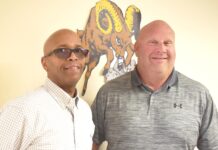
By Murray Siegel
There is no question understanding and utilizing technology are vital tools for a successful career. Those considering the social sciences, the financial industry or the arts for one’s vocation must be able to function with technology, and it is helpful to have a strong background in science.
An article in the Aug. 7 edition of New York Times (page A23 “Make Your Daughter Practice Math) highlighted a researcher who is concerned about preparing young female students for a world where competence in STEM (science, technology, engineering, mathematics) is a requirement.
Barbara Oakley, the author of the article, is an engineering professor at Oakland University in Rochester, Michigan, and authored the book “Learning How to Learn.” Oakley is convinced research demonstrates the key to STEM success is a solid foundation in mathematics.
Parents of daughters must be concerned about their children’s mathematical development. Research results show boys and girls have similar abilities in mathematics, while girls generally outperform boys in reading and writing. Many girls believe they are better in language arts than in math and translate this into a belief that they are really not good in math. This leads to a lack of effort in math lessons. The basis for this behavior is false since girls can excel in mathematics the same as boys.
Mathematics is the language of science, engineering and technology, and as a language it is acquired using in-depth practice.
Professor Oakley writes, “Unfortunately, thinking you’re not very good at something can be a quick path to disliking and avoiding it, even if you do have natural ability. You can begin to avoid practicing it, because to your mind that practice is more painful than learning what comes more easily. Not practicing, in turn, transforms what started out as a mere aversion into a genuine lack of competence. Unfortunately, the way math is generally taught in the United States – which often downplays practice in favor of emphasizing conceptual understanding – can make this vicious circle even worse for girls.”
What is the professor’s advice for parents of girls? She emphasizes, “Do your daughter a favor – give her a little extra math practice each day, even if she finds it painful. In the long run, she’ll thank you for it. (And, by the way: the same applies to your son.)”
Murray Siegel, Ph.D., has 42 years of teaching experience. He is a volunteer teacher of advanced math classes at Butterfield Elementary School.
This column appears in the October issue of InMaricopa.


![Who’s the Best Mom InMaricopa? Nominate now! Marlene Marshall, Christina Olivares, and Meghan Bremer. [Bryan Mordt]](https://www.inmaricopa.com/wp-content/uploads/2023/05/BCM_8465-218x150.jpg)









![Alleged car thief released without charges Phoenix police stop a stolen vehicle on April 20, 2024. [Facebook]](https://www.inmaricopa.com/wp-content/uploads/2024/04/IMG_5040-218x150.jpg)

![3 things to know about the new city budget Vice Mayor Amber Liermann and Councilmember Eric Goettl review parts of the city's 2024 operational budget with Mayor Nancy Smith on April 24, 2024. [Monica D. Spencer]](https://www.inmaricopa.com/wp-content/uploads/2024/04/spencer-042424-preliminary-budget-meeting-web-100x70.jpg)


